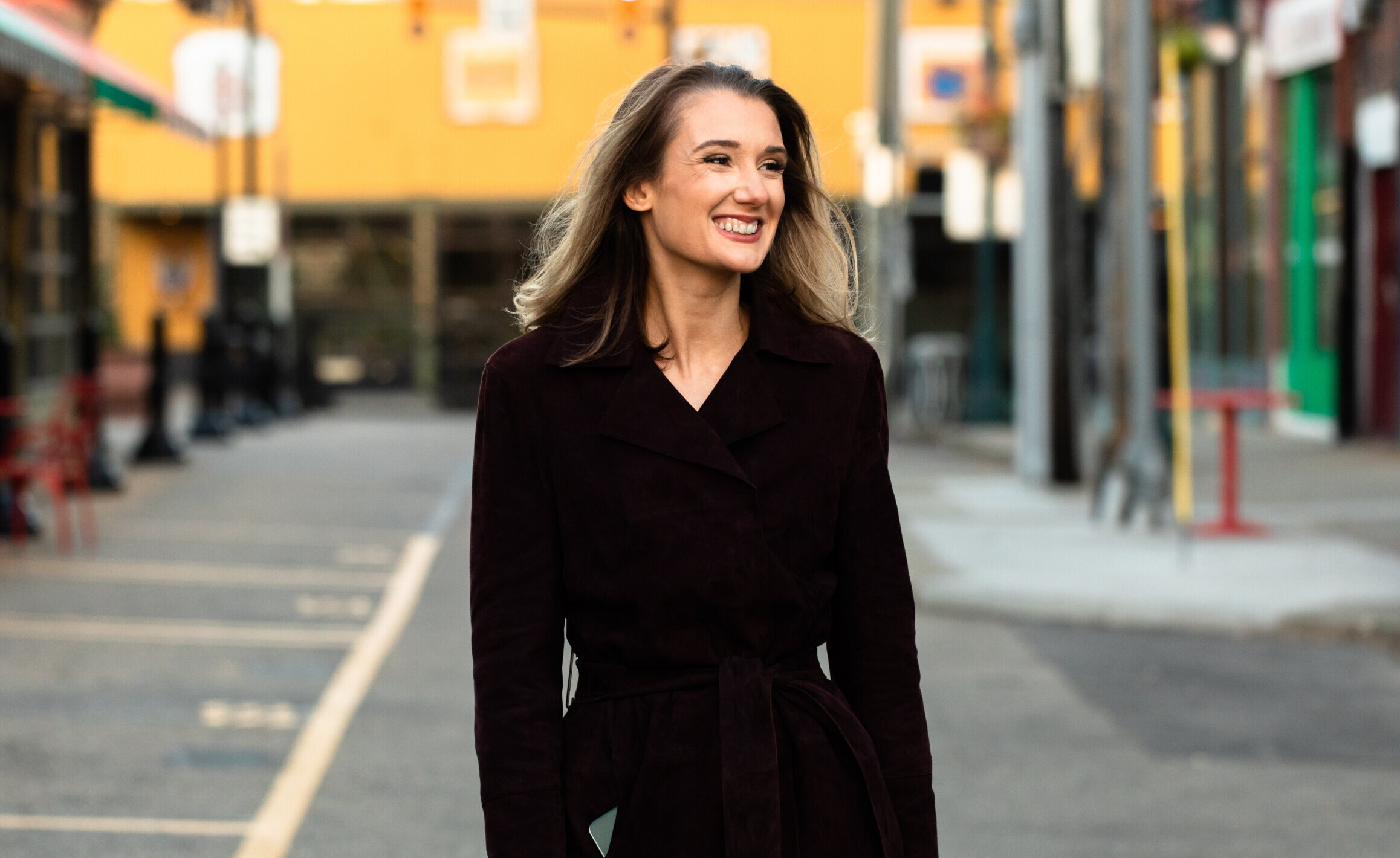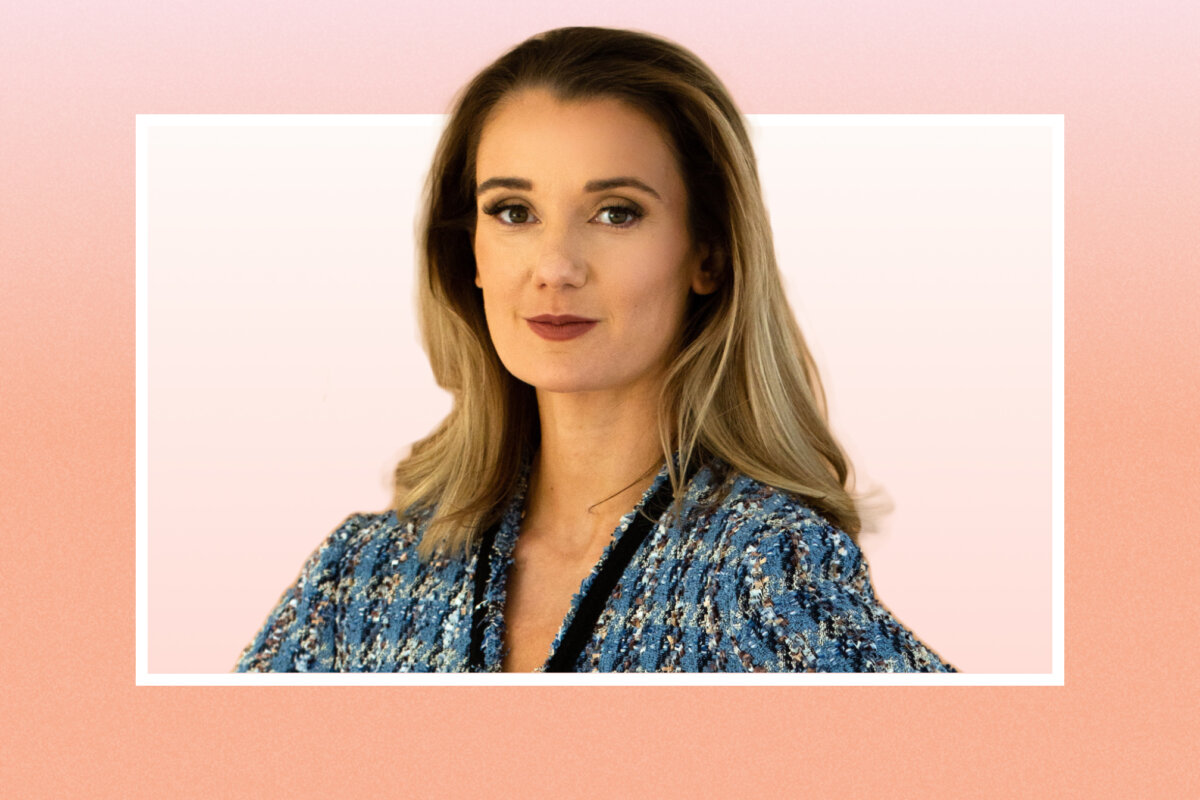As a new mom, Allison Robinson asked if it was possible to have a family and a career. The answer, of course, proved complicated. As Robinson began her return to the workforce, she noticed a lack of resources for working mothers — especially those who have left for more extended periods or require a more flexible schedule than the standard 9-to-5.
So she founded The Mom Project, a digital platform that now connects one million+ talented professional moms to 3,000 companies via hiring, education and retention solutions. As CEO, Robinson led The Mom Project to raise $116 million in funding, the most significant global investment in female workforce development. And she didn’t stop there. In 2020, The Mom Project launched RISE, a non-profit scholarship program that helps women of color find greater economic opportunity in high-demand industries through support and upskilling. Every day, The Mom Project proves that mothers can succeed professionally — on their own terms.
Today, Robinson walks us through her working mom career, including periods of struggle and her thoughts on how to support women daily.
Tell us what’s sparking joy for you right now.
My kids are at really fun ages — seven, five and one — and the time we spend together laughing and being silly as a family is my most joyful. We moved to Miami less than two years ago, and it’s been a constant adventure exploring new places, hobbies and cultures. We also love being near the ocean!
I’m also finding great joy in what we’re building at The Mom Project to design and expand solutions that we believe can help many people find meaningful pathways to economic advancement. I’m fortunate to work with an amazing team of talented and kind people who are so passionate about our purpose, which brings me real joy.
Tell us a little about the origins of The Mom Project. How has it evolved since you launched in 2016?
Before becoming an entrepreneur, I worked on the Pampers brand at Procter & Gamble (P&G) for several years. That role allowed me to spend much of my time with moms, leading to one of my most significant insights: Women will achieve the impossible to build a better life for their families.
[But it wasn’t until] becoming a mom myself that I discovered how many women leave the workforce after having children. There was a significant gap in the market for women who wanted to find meaningful work that was also compatible with being a parent. If we could fill this void, I thought it would unlock something tremendous in our economy — and that truly great things could happen. So I decided to build it.
The company has grown beyond what I could have ever imagined. We’ve connected our moms with over $400M in economic impact to date. The platform serves over one million moms, dads and allies, connecting them with thousands of companies ranging from small businesses to the Fortune 10.
In many ways, it feels like we’re just getting started. We take our work and responsibility very seriously because seven years into this work, we understand better than ever the depth of this problem and how important it is to solve it nationally and globally.
You also run RISE, which Fast Company included on its list of 2022 World-Changing Ideas. How does RISE work?
Yes! RISE is critical to The Mom Project story and our evolution. We founded it in 2020 as a direct response to the disproportionate impact COVID-layoffs had on women of color.
We knew the power of The Mom Project platform — what our deep customer relationships and strong talent community could do to create economic opportunities for moms. And we were uniquely positioned to be part of the solution. So we launched RISE as the not-for-profit, equity-focused, upskilling arm of The Mom Project. RISE equips our moms and women of color with the certifications and new skills they need to land in-demand jobs in high-paying fields, such as data analytics, digital marketing, IT support, user experience (UX), design and project management.
In just two years, RISE has become one of the most successful upskilling programs for underrepresented women. We’ve been able to help 7,000 women and moms of color elevate their earning potential and career opportunities. Our program can create approximately $10,000 in annual salary increases, totaling almost $1.1 million in economic lifetime earning potential for our candidates. But it’s the stories for me. The stories of the women we’re helping through this program are life-changing.

Given the nature of your work, if you had to pick just one, what would you say is the greatest challenge for women and moms today?
The last decade or so has brought some material progress for women and mothers in the workplace. Certainly, there is greater awareness and acknowledgment of the structural challenges women have battled for generations. I’m thinking of what I roughly categorize as “the motherhood penalty” — workplace bias, pay inequities, lack of access to family benefits, the high costs and accessibility of childcare, to name a few.
It’s a long journey to fix these structural inequities, requiring innovation and collaboration across the private sector and with policymakers. Also, frankly, we’re going to have to change the habits and practices we model in our own families and communities, which form so much of our societal context at an early age.
So that’s my number one. But something else I think is a very real impediment for women right now is the need to be constantly available – whether by phone, email or what have you. Being “always on” harms our mental state, and I think women carry this burden in unhealthy, unsustainable ways.
The good news seems to be that more and more women are saying: Enough. There’s been a marked push to do less — even nothing — sometimes. Marie recently went on the record that her life is messier now because she had to pick what to prioritize, and her priority is her three children. What do you think of the possibility of “having it all”? Should we want that?
As a mom of three and a CEO, Marie’s admission is incredibly refreshing. I love it when women tell their real, authentic stories. Of course, it’s not possible to have it all. (Whoever started that rumor didn’t do any of us any favors!)
Throughout the arc of our lives, our priorities will ebb and flow. Life is fluid. All we can ask of ourselves is to do what feels right for the moment we’re living in, and we should feel free to do that without fear of judgment. Remember, no one has walked your path.
Along those lines, self-care looks very different when you’re raising kids. What are some of the rituals that you’ve built in your life to take care of your mind, body and soul? Any tips for new (or not-so-new!) moms struggling to create that time?
I’m going to be candid: In 2022, after six years of building The Mom Project and some personal loss, I’d slowly let my health slip. Ignoring the signs took toll on me emotionally and physically, and I suffered from mental health challenges that significantly impacted my ability to work and lead. So, I took a sabbatical last summer to take care of myself and prioritize my health. I spent time assessing and leaning into what I needed the most. [I wanted] to find me again — but a stronger, healthier me with new perspectives.
My return to self-care started simply — deleting social media from my phone, taking daily walks, spending uninterrupted time with my family and friends and being more present. I also realized embracing organization and order in my home was a huge contributor to my sense of mental wellness, so I was able to lean into Marie’s philosophy during this time. I found so much reward turning my home into a place that brought me more joy. Specifically, I designed a playroom for my kids that has become this special place for us where we read and play. It’s my happy place. It’s incredible how our physical spaces can be such a source of emotion.
It’s still a constant journey, but I feel like I am in a much healthier place than I was a year ago. The experience was so helpful I introduced a sabbatical program for our employees at The Mom Project.
“Life is fluid. All we can ask of ourselves is to do what feels right for the moment we’re living in, and we should feel free to do that without fear of judgment. Remember, no one has walked your path.”
Now that you’ve returned from sabbatical, what does a day at the office look like for you?
I am fortunate to work from home, so my day starts with making a cup of coffee and settling in for the day. And, because I consider myself creative at heart, I like to end my day with a period where I can step away from the fast-paced day-to-day to just build, write and think.
Of course, as CEO I am accountable to many stakeholders — including our employees, our Board of Directors, our customers, our community and our partners. It’s a constant juggling act to prioritize my time. But I am finding ways to focus on the most impactful areas for both our short-term goals and long-term vision.
What are some general misconceptions about working moms? Anything that might surprise our readers?
Moms are a force. One of our customers shared this sentiment which emulates the value moms bring to the workforce, “Moms don’t just bring experience to the table — they built the very table.”
We hear all the time that when a mom from our community joins a company, she is one of the best hires. Moms are just so much more efficient at getting things done. Moms also bring unique leadership skills that are superpowers — like empathy, caring for one’s well-being, and high emotional intelligence.
We recently did a survey where we found that 23% of female employees with mom colleagues report having a more positive overall workplace experience than those with no mom colleagues. Mom managers more strongly care for and prioritize employee well-being, rating 18% more favorably than other managers.
These are all essential attributes when leading in virtual or hybrid environments and in uncertain, ambiguous and challenging times. Moms really can meet this moment in the workforce!
There’s so much that needs improving when it comes to women — and mothers — at work, and that can feel overwhelming to an individual person who wants to do everything they can to support other women. Beyond institutional/structural change, what is the number one thing someone like our reader can do to show up for other women? And if she’s a mom, show up for other moms?
I love this question. My simple advice is to set a goal for how you will intentionally help another woman, another mom, once a month, once a week — whatever feels reasonable. The smallest gestures, such as making an introduction or referral, can make the world of difference.
“Moms bring unique skills that are superpowers — like empathy and high emotional intelligence. These are essential attributes when leading in virtual or hybrid environments, uncertain ambiguous and challenging times. Moms really can meet this moment in the workforce!”
What advice do you give most often to women who have left the workforce for some time and are uncertain about how to return? Are there any resources you’d like to share besides The Mom Project?
Great question because it is integral to our origin story. Whether you are looking to return after months or years of being out of the workforce, The Mom Project focuses on helping you find your next chapter, whether that’s full-time, part-time or contract work. We actively work with companies ranging from small- and mid-size businesses to Fortune 500 companies to help moms and allies find roles that support working parents. Our site also has many articles and resources such as resume building, interview prep and coaching — even child care resources to help when you get that interview. In addition to The Mom Project, I also highly recommend Path Forward & iRelaunch.
What are you talking about in your inner circle right now? What’s gotten you excited recently?
Living in a new city has introduced a lot of interesting new conversations into my life. Miami is so vibrant. I’ve really been enjoying learning a lot about new cultures and making friends from all over the world.
In a few words, how would you define your kurashi, or your ideal life?
In my ideal life, family is the center of my universe. I am surrounded by purposeful work and good friends who share my love for good food, conversation and laughter.








